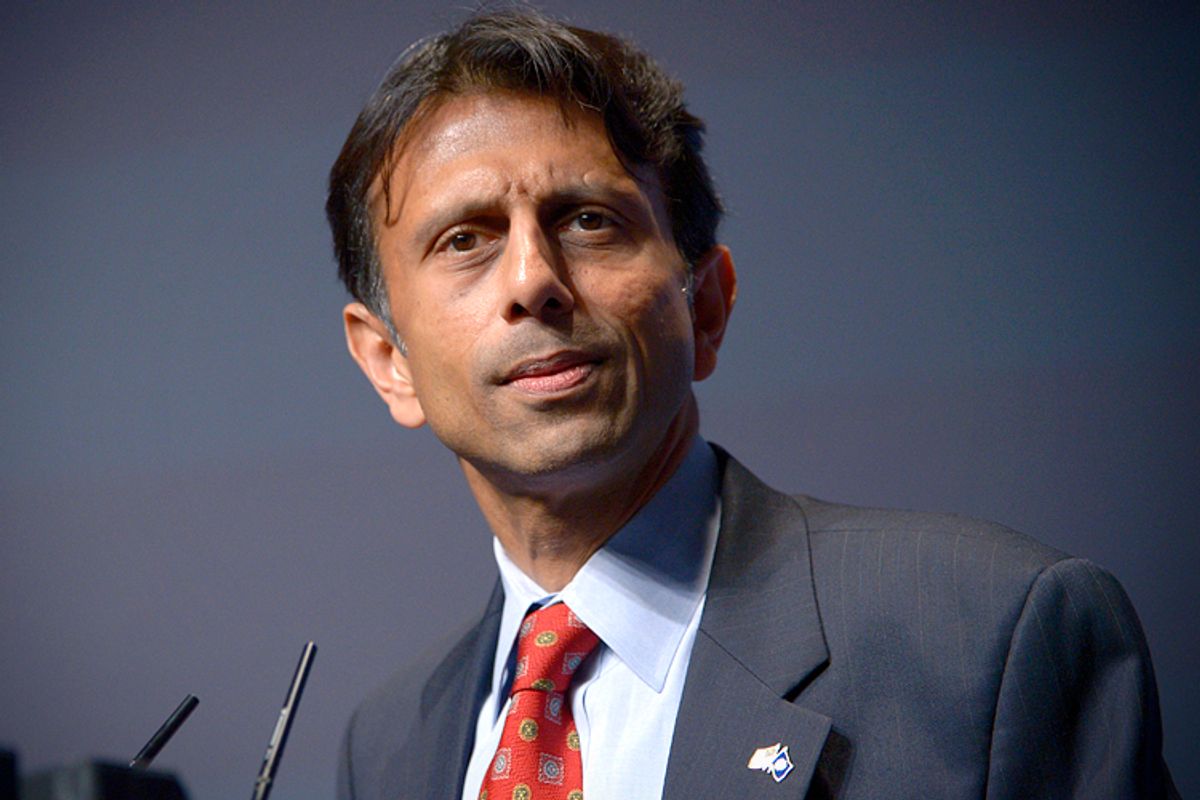Excitement over King v. Burwell and the promise of Obamacare’s judicially mandated demise has led to a flurry of activity among Republicans to come up with the “conservative replacement” for the healthcare law they love to hate. Part of this frenzy is for show – if the Republicans can make it look like they’re at least minimally capable of acting to minimize the fallout from tearing away Obamacare’s insurance subsidies, then the Supreme Court’s conservative justices will (the thinking goes) be more apt to strike them down. With the decision expected to come down early this summer, the GOP is scrambling to come up with a plan that everyone can agree on.
The problem is that Republicans have trouble on agreeing on matters as basic as whether to fully fund the government. Arriving at a consensus on a sprawling piece of legislation that will reshape the government’s relationship with the individual is a much, much taller order, which is why the party has been trying unsuccessfully for years to fill in the “replace” portion of their “repeal and replace” mantra.
One big factor driving this intractable intraparty squabbling is that no one can seem to agree on what constitutes a “conservative” plan for healthcare reform – which is to say that there are plenty of people claiming to have the only healthcare reform plan that is truly conservative. That brings us to Louisiana governor and beefcake slab of manly power Bobby Jindal, who is making a renewed PR push for the healthcare reform plan he released last April. In an Op-Ed for Politico this week, Jindal warned that conservatives are about to be betrayed by Republicans in Washington:
There is a secret that people outside of Washington, D.C., aren’t aware of right now: Some Republicans in Congress are on the verge of proposing an alternative to Obamacare that imposes new tax hikes on the American people.
Oh no! The only way for the party to stay true to its principles, he writes, is to embrace a “truly conservative” plan – like the one put forth by Bobby Jindal.
Not only is Jindal hyping his plan as the One True Conservative Healthcare Reform, he’s also busily slapping down D.C. Republicans (and conservative health policy writer Avik Roy) as posers and coddlers of big government liberalism. In fact, Jindal’s Op-ed hardly mentions his own plan – the vast majority of it is devoted to accusing Republicans in DC of “being ‘cheap’ Democrats, or Democrat-lite.” Jindal writes: “I don’t believe that any plan that repeals and replaces Obamacare’s trillions in taxes and spending is a conservative alternative.”
In many ways this is a silly argument – if Jindal is defining “true” conservatism as a health plan that doesn’t impose lots and lots of new spending, then what he’s really pushing for is a plan that a) won’t work, or b) isn’t “conservative.” Jindal’s own plan (vaguely defined as it is) probably wouldn’t make it through the Republican-controlled House of Representatives because it would likely cost too much for conservatives to bear.
The trouble arises when you start taking into account the various mechanisms for guaranteeing coverage. One of the Affordable Care Act’s most popular provisions is the prohibition on insurers discriminating against people with preexisting conditions. Jindal’s plan would repeal Obamacare entirely, freeing insurers to deny coverage to people who are already sick. His solution for this is to use federal tax dollars to subsidize high-risk pools and other “risk transfer mechanisms” at the state level. “The incentive pool of federal dollars would allow states to determine the best mechanism for providing access to those with pre-existing conditions, and a stable source of funding for those endeavors,” his plan states.
High-risk pools, a staple of Republican reform proposals, only work if there’s a lot of money backing them up. “The pools would need to be incredibly well-funded,” health policy writer Adrianna McIntyre wrote in 2013. “Conservative health policy scholar James Capretta estimated that adequate funding would be on the scale of $15-20 billion a year to cover 4 million individuals.” And there are some conservatives who believe that the existence of a heavily subsidized marketplace for catastrophic coverage will discourage people from buying insurance until they’re actually sick and can take advantage of the federal subsidy.
For some Republicans in Congress, the notion of spending federal money to subsidize health insurance is anathema. An attempt by former House majority leader Eric Cantor to divert Obamacare funds to set up a temporary federal high-risk pool was defeated by conservatives who felt it violated their small-government principles. “Subsidizing healthcare is not what Republicans should be about,” Rep. Raul Labrador (R-ID) said of the measure. Conservative members were backed by influential outside groups like Heritage Action: “We are opposed to federal high risk pools and don’t believe Congress should be expanding Obamacare programs.”
The cost of Cantor’s plan? A relatively paltry $4 billion. Jindal’s high-risk-poll plan, by his own estimates, will cost $100 billion over 10 years. Even if he’s not low-balling it, that still puts him well above what Republicans in Congress have already rejected, and well below the estimates for how much funding would be needed for the pools to be effective. So, actually, when I wrote that Jindal’s quest for conservative purity in healthcare would result in a plan that either won’t work or isn’t “conservative” enough, I overlooked a third option: it could, like his own plan, end up being both.

Shares